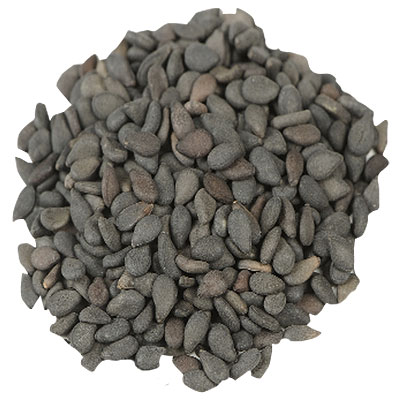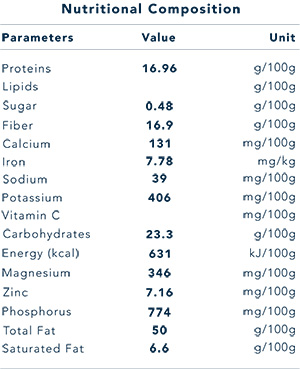
Scientific Name
Sesamum indicum
Color
Black or White
Production Areas
Santa Cruz, Bolivia
Grade
Conventional

Scientific Name
Sesamum indicum
Color
Black or White
Production Areas
Santa Cruz, Bolivia
Grade
Conventional

Facts
Sesame seeds come from a plant native of Africa and India; though different varieties now grow around the world, they especially thrive in Latin America. It is a very versatile food because both the seed and its oil can be consumed, and a variety of products can easily be made at home from this tiny delicacy.
Sesame is a plant grown for its oil-rich seeds, and high protein, besides being rich in methionine, an essential amino acid.
Sesame contains unsaturated fats, which together with its lecithin content, make the sesame seeds a food that helps reduce blood cholesterol levels.
Nutrients
Vitamins B1, B2, B3, B6, B7, B9 and E. Boron, calcium, zinc, cobalt, copper, chromium, iron, magnesium, manganese, nickel, potassium, sodium, iodine, phosphorus.
Preliminary Health Research
Its extraordinary contribution of calcium and iron, as well as its beneficial polyunsaturated fatty acids, make this one of the star seed elements that should not be missing from the kitchen cupboard, especially considering its great taste.
Sesame seeds contain numerous minerals, such as phosphorus, potassium, magnesium, zinc, etc. But the highlight is the extraordinary contribution of calcium. Sesame seeds are one of the richest sources of calcium you can find. It is a crucial food that should be present in the diet of children and in postmenopausal and pregnant women. Contains nearly twice the calcium as milk and its consumption does not involve the absorption of hormones or antibiotics present in milk products.
Advantages
Protect the cardiovascular system, improves the condition of diabetics, improve depression, prevent osteoporosis, contains antioxidants, protect the digestive system, improve oral health.
Use
In Western culture, sesame (particularly its oil) has been used for skin care and treatment of pain: burns, aching joints, snake bites, headaches, earaches, etc. probably due to its protective function. In Hindu culture, sesame seeds represent a symbol of immortality and sesame oil is widely used in prayer and rituals. In traditional Chinese medicine, many remedies utilize this plant.